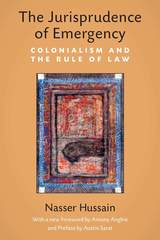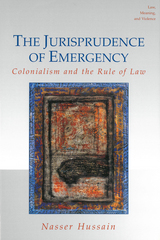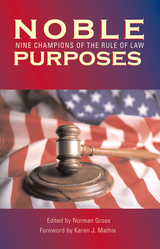
The Jurisprudence of Emergency examines British rule in India from the late eighteenth to the early twentieth century, tracing tensions between the ideology of liberty and government by law used to justify the colonizing power's insistence on a regime of conquest. Nasser Hussain argues that the interaction of these competing ideologies exemplifies a conflict central to all Western legal systems—between the universal, rational operation of law on the one hand and the absolute sovereignty of the state on the other. The author uses an impressive array of historical evidence to demonstrate how questions of law and emergency shaped colonial rule, which in turn affected the development of Western legality.
The pathbreaking insights developed in The Jurisprudence of Emergency reevaluate the place of colonialism in modern law by depicting the colonies as influential agents in the interpretation of Western ideas and practices. Hussain's interdisciplinary approach and subtly shaded revelations will be of interest to historians as well as scholars of legal and political theory.

Ever-more-frequent calls for the establishment of a rule of law in the developing world have been oddly paralleled by the increasing use of "exceptional" measures to deal with political crises. To untangle this apparent contradiction, The Jurisprudence of Emergency analyzes the historical uses of a range of emergency powers, such as the suspension of habeas corpus and the use of military tribunals. Nasser Hussain focuses on the relationship between "emergency" and the law to develop a subtle new theory of those moments in which the normative rule of law is suspended.
The Jurisprudence of Emergency examines British colonial rule in India from the late eighteenth to the early twentieth century in order to trace tensions between the ideology of liberty and government by law, which was used to justify the British presence, and the colonizing power's concurrent insistence on a regime of conquest. Hussain argues that the interaction of these competing ideologies exemplifies a conflict central to all Western legal systems—between the universal, rational operation of law on the one hand and the absolute sovereignty of the state on the other. The author uses an impressive array of historical evidence to demonstrate how questions of law and emergency shaped colonial rule, which in turn affected the development of Western legality.
The pathbreaking insights developed in The Jurisprudence of Emergency reevaluate the place of colonialism in modern law by depicting the colonies as influential agents in the interpretation and delineation of Western ideas and practices. Hussain's interdisciplinary approach and subtly shaded revelations will be of interest to historians as well as scholars of legal and political theory.

Michael Hayes offers a vigorous defense of incrementalism: the theory that the policymaking process typically should involve bargaining, delay, compromise, and, therefore, incremental change. Incrementalism, he argues, is one result of a checks-and-balances system in which politicians may disagree over what we want to achieve as a nation or what policies would best achieve shared goals.
Many political scientists have called for reforms that would facilitate majority rule and more radical policy change by strengthening the presidency at the expense of Congress. But Hayes develops policy typologies and analyzes case studies to show that the policy process works best when it conforms to the tenets of incrementalism. He contends that because humans are fallible, politics should work through social processes to achieve limited ends and to ameliorate—rather than completely solve—social problems. Analyzing the evolution of air pollution policy, the failure of President Clinton’s health care reform in 1994, and the successful effort at welfare reform in 1995-96, Hayes calls for changes that would make incrementalism work better by encouraging a more balanced struggle among social interests and by requiring political outcomes to conform to the rule of law.
Written for students and specialists in politics, public policy, and public administration, The Limits of Policy Change examines in detail a central issue in democratic theory.

READERS
Browse our collection.
PUBLISHERS
See BiblioVault's publisher services.
STUDENT SERVICES
Files for college accessibility offices.
UChicago Accessibility Resources
home | accessibility | search | about | contact us
BiblioVault ® 2001 - 2025
The University of Chicago Press









